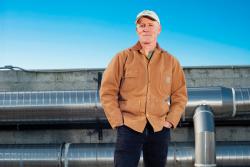ECS is featured in this month’s issue of Seattle Business Magazine.
Here is an excerpt from the article:
A local designer of compost systems is expanding rapidly.

Article by Anthony Adragna
Back in the early 1990s, Tim O’Neill and a colleague began to develop large-scale systems for the sort of cutting-edge, environmentally conscientious composting that few people engaged in at the time. Since then, as municipalities of all sizes from around the country have embraced the concept of turning organic waste into something useful, O’Neill’s Engineered Compost Systems (ECS) has become a national leader in designing large composting systems.
In 1990, communities across the United States composted 4.2 million tons of the 208.3 million tons of waste they generated. Twenty years later, more than 20.8 million tons of the 243 million tons of waste generated were composted and recovered. Washington state facilities alone processed 1.15 million tons in 2010. In 2009, about 3,000 communities in the United States had documented composting programs. Americans now recycle or compost almost 34 percent of their total waste, more than double the rate from 1990.
With greater national environmental awareness comes the need for facilities to compost waste. Launched by O’Neill in 1999, ECS has delivered more than 45 composting systems for municipalities and commercial clients in the United States and Canada.
O’Neill says ECS typically customizes facilities around two main types of aerobic composting systems. In-vessel systems are essentially small chambers that are completely enclosed. The facilities are stable and allow clients to tightly control air and temperature settings, enabling the composting process to happen more quickly. Since the system requires a structure to be built, the costs are higher than for the other ECS method, known as an Aerated Static Pile or ASP. In this method, a large mound of waste outfitted with a system that enables air to flow through the pile. O’Neill says the floors of the facilities are customized for clients, but ECS has found a way to build them more economically than many competitors while retaining rigid temperature and air controls.
“Most of the technology-based compost equipment companies are single technology,” O’Neill adds. “They try to fit their vision of the world to everybody’s reality. We take the opposite approach. You can see 40 different clients, each one with a somewhat different design.”
Interest in constructing systems comes from both the public and private sectors. Public clients range from small towns to large municipal entities handling the composting needs of several cities. No matter the client, O’Neill says the sales process is slow, often lasting from one to five years.
After a potential client expresses interest
Credit:
Engineered Compost Systems CEO Tim O’Neill.
in building a system, ECS develops a preliminary design and builds an economic model. One third of all prospective clients continue on to a pilot system, which enables both the client and regulators to get a sense of what the system will do. The pilot programs are smaller than the full-scale systems and typically operate for six months.
O’Neill says ECS’s business grew during the past several years, despite the difficult economy. “The first six years were pretty slow growth,” he says. “We were break-even the whole time. Anytime we made money, we turned it around and put it back into product or marketing development work. The last four or five years, it’s been quite strong and quite steady and on a growth path.”
Eric Myers, director of organic recycling operations with Waste Management, is a satisfied ECS customer. Waste Management installed two ECS systems in Florida and is extremely pleased with the results. “ECS has been a great partner in developing these facilities,” Myers notes. “Both facilities are ramping up the volumes we are recycling, and the systems are performing well and as designed.”
In Washington, ECS has installed systems in Spokane, Everett, Tenino, Westport, Walla Walla, Omak, Stanwood, Lynden, Arlington, Ocean Shores, La Conner, Port Angeles and Puyallup. Other major systems are operating in Okeechobee, Florida; Dixon, California; and West Yellowstone, Montana. A team of 10 employees designs the technology, writes the necessary software and builds the controls and instrumentation from ECS’s offices in Seattle’s Magnolia neighborhood.
As both federal and state regulations continue to change, ECS has maintained strict environmental standards about the air pollution, odor and surface water at its facilities. With new regulations and standards likely, more communities have been willing to invest in composting systems.
Though industry growth remains slow, O’Neill says he is content with the size and volume of business. “Slow growth is great,” he explains. “We have no debt, we’re in the black and that’s not a bad place to live. I have no aspirations to grow into a large company and sell it. My employees put in a lot of work to get it to here, and I’d like them to continue to have a great place to work.”